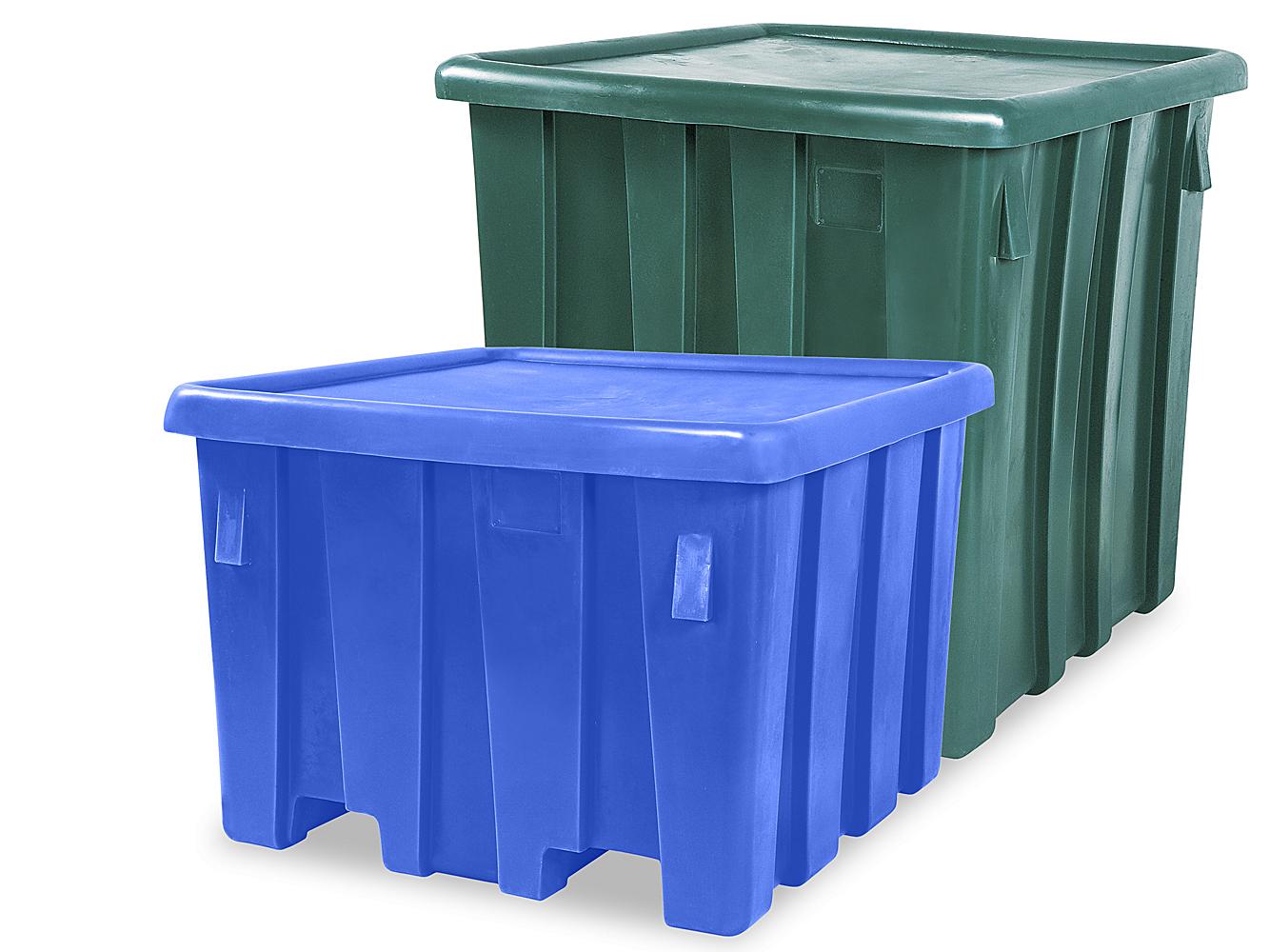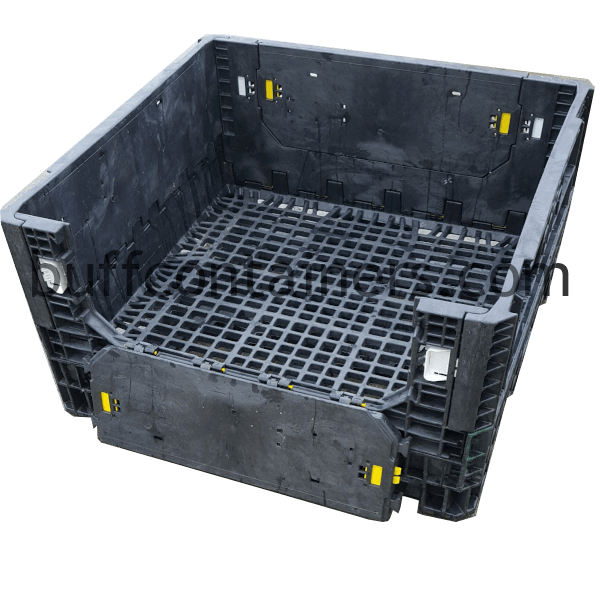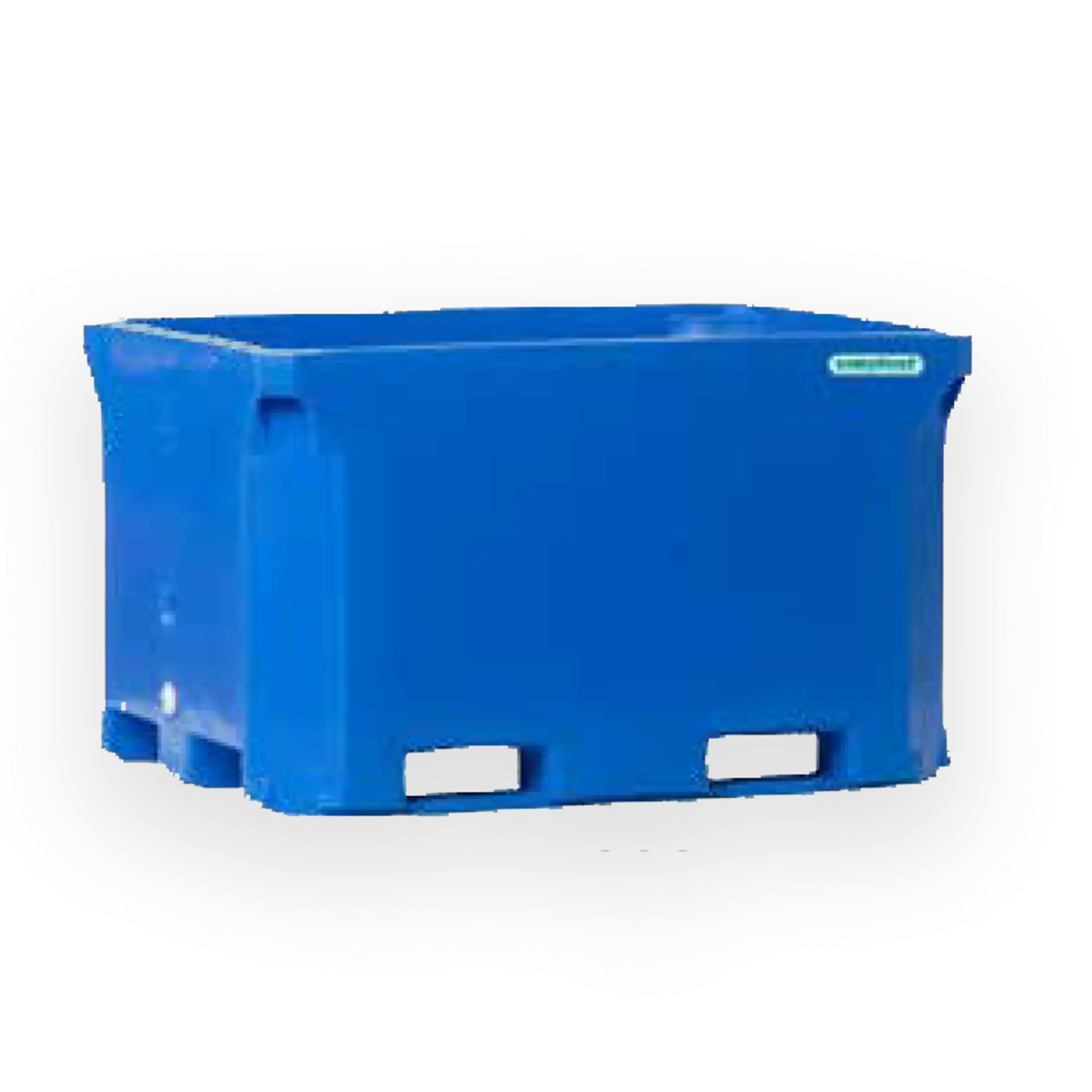A Comprehensive Overview to the Different Sorts Of Mass Plastic Containers Available Today
Mass plastic containers play a vital duty in numerous industries, providing remedies for storage and transport. Their diverse kinds accommodate various demands, from stiff choices for solid materials to adaptable containers accommodating numerous forms. Each type offers distinct benefits, making it important to understand their attributes and applications. As markets advance, so do the demands for reliable container options. What factors should one consider when picking the best mass container?
Review of Bulk Plastic Containers

Kinds Of Bulk Plastic Containers
Mass plastic containers can be found in different types, each fit to specific applications. Rigid mass containers, adaptable bulk containers, and intermediate mass containers stand for the main groups, each offering special benefits. Understanding these types is necessary for choosing the ideal container for transporting and keeping products.

Stiff Mass Containers
Stiff bulk containers are critical for efficient storage and transport of different products across sectors. These containers are generally created from durable plastics, permitting them to withstand extreme handling and environmental conditions. They can be found in various forms and dimensions, including drums, totes, and containers, making them ideal for storing everything from granular materials to fluids. Inflexible containers commonly feature enhanced wall surfaces and protected lids, guaranteeing the materials stay protected during transit. Their stackable design takes full advantage of storage area, making them optimal for storehouses and producing centers. Furthermore, many stiff mass containers are recyclable and recyclable, contributing to sustainability efforts. Generally, their robustness and versatility make inflexible bulk containers an essential component in supply chain procedures.
Versatile Bulk Containers
Adaptable bulk containers, typically referred to as versatile intermediate mass containers (FIBCs), act as a flexible remedy for saving a variety and transferring of completely dry materials. These containers are typically made from woven polypropylene and are designed to be light-weight yet solid, enabling for effective handling and piling. Their adaptability enables them to accommodate different forms and sizes, making them appropriate for products ranging from grains to chemicals. FIBCs can be furnished with functions such as spouts for very easy dental filling and discharge, along with safety finishes for enhanced resilience. Additionally, they are recyclable and recyclable, adding to lasting methods in industries like farming, food handling, and building and construction. On the whole, adaptable mass containers provide a effective and affordable option for mass product monitoring.
Intermediate Bulk Containers
Intermediate bulk containers (IBCs) are essential for the efficient transportation and storage of fluids and granular products across numerous industries. These containers commonly have a capacity ranging from 275 to 330 gallons and are made for easy dealing with and stacking. Made from sturdy materials like high-density polyethylene or steel, IBCs give outstanding security versus contamination and environmental elements. Their style includes attributes such as a built-in pallet for forklift gain access to and a removable top for simple dental filling and cleaning. IBCs are widely utilized in chemical, food, and pharmaceutical sectors, guaranteeing conformity with safety laws. Their versatility and reusability make them a cost-efficient service for mass storage and transportation, adding to supply chain efficiency and sustainability.
Attributes and Benefits of Bulk Plastic Containers
Bulk plastic containers are essential devices in different industries, supplying a mix of durability and usefulness. These containers are created from high-quality products, making them immune to influences, chemicals, and ecological factors. This toughness warranties item safety throughout storage and transport.
Furthermore, bulk plastic containers are light-weight, facilitating simplicity of taking care of and reducing delivery prices. Their stackable design optimizes storage efficiency, enabling for maximized storage facility area. Lots of designs include secure lids or closures, giving an airtight seal that maintains materials and stops contamination.
Additionally, bulk plastic containers are often multiple-use and recyclable, adding to sustainable methods. Their versatility permits for a variety of applications, from food storage space to industrial usage, boosting their worth across industries. Businesses profit from the lengthy life-span and reduced upkeep demands of these containers, making them a cost-effective service for both short-term and long-term requirements.
Industries That Use Mass Plastic Containers
Different industries gain from the use of bulk plastic containers, each leveraging their unique properties for details applications. The food and drink sector counts on these containers for risk-free storage space and transportation of products, while the chemical manufacturing sector uses them for dealing with harmful products. In addition, the pharmaceutical distribution requires highlight the relevance of toughness and sanitation in product packaging options.
Food and Drink Industry
As the need for secure and effective storage space remedies proceeds to climb, the food and beverage sector significantly depends on bulk plastic containers for their functional demands. These containers supply robust, light-weight, and flexible choices for saving active ingredients, completed products, and waste materials. Made from food-grade products, they assure conformity with wellness and safety and security requirements. Different styles, such as stackable containers and carry boxes, enhance space throughout transportation and storage space, enhancing logistical effectiveness. Furthermore, the openness of some mass containers enables simple supply administration, lowering the risk of spoilage. With the market's concentrate on sustainability, several manufacturers are now supplying reusable and recyclable alternatives, aligning with green methods while meeting the high needs of food safety and health.
Chemical Manufacturing Market
The chemical production field relies heavily on mass plastic containers for the reliable and secure storage space of basic materials, intermediates, and ended up products. These containers are made to hold up against numerous chemicals, ensuring that unsafe materials do not leakage or deteriorate the container itself. Common types include high-density polyethylene (HDPE) and polypropylene containers, which offer excellent chemical resistance and resilience. Their lightweight nature and stackable style help with transport and storage space, maximizing area in making centers. Additionally, numerous bulk plastic containers feature features such as tamper-evident seals and easy-to-read labeling, enhancing safety and security and compliance with sector regulations. In general, bulk plastic containers are indispensable to the chemical production procedure, providing dependable solutions for taking care of diverse substances.
Drug Distribution Requirements
Drug distribution relies upon bulk plastic containers to satisfy stringent security and governing requirements. These containers are important for carrying and storing a variety of pharmaceutical products, including energetic pharmaceutical ingredients (APIs) and finished drugs. Their layout guarantees protection versus light, contamination, and moisture, keeping the integrity of sensitive products. In addition, bulk plastic containers are compliant with industry requirements such as Great Production Practices (GMP) and are usually made from materials that are FDA-approved. Making use of these containers improves efficiency in the supply chain, enabling risk-free, large distribution while reducing waste. Firms in the pharmaceutical sector prioritize using durable, leak-proof, and tamper-evident containers to guarantee item safety and security and top quality throughout the logistics process.
Factors to consider for Choosing the Right Container
When choosing the appropriate bulk plastic container, numerous aspects have to be meticulously evaluated to assure optimal capability and security. The nature of the find out materials to be stored is extremely important; compatibility with the container's material can influence stability and safety and security. Bulk Plastic Containers. In addition, the container's dimension and shape should align with the storage space and transportation demands, guaranteeing efficient area use
Load capability is another crucial factor to consider, as it must suit the weight of contents without risk of damage or failing. The browse around these guys style features, such as airing vent or lids, can influence functionality and access. Compliance with sector policies is important, specifically in industries like drugs, where security requirements are rigid.
Ultimately, the expected life expectancy and resilience of the container ought to be assessed to confirm it satisfies the operational demands without frequent substitute. By examining these factors, one can select one of the most appropriate mass plastic container for specific applications.
Environmental Influence and Sustainability
As services increasingly focus on sustainability, the ecological influence of mass plastic containers has come under analysis. These containers, commonly made from products such as polyethylene or polypropylene, contribute greatly to plastic waste if not taken care of properly. Their production includes the consumption of nonrenewable fuel sources, which can cause increased greenhouse gas emissions. Improvements in reusing technology and the advancement of eco-friendly options are assisting to mitigate these worries.
Numerous producers are taking on techniques that stress the usage of recycled materials, thus lowering the demand for virgin plastics. The durability of bulk plastic containers also contributes; they are created to be recycled several times, which can minimize their total environmental footprint when contrasted to single-use alternatives. Inevitably, the sector faces the difficulty of balancing performance with environmental obligation, making sustainable techniques necessary for the future of mass plastic containers.
Finest Practices for Storage and Transportation
Efficient storage and transportation of bulk plastic containers considerably affect both functional performance and sustainability. To maximize room, companies need to stack containers firmly, assuring stability and avoiding damage. Appropriate labeling is necessary for easy identification, which enhances retrieval processes. Additionally, maintaining a clean and well organized storage space this post location lowers the threat of contamination and enhances safety and security.
For transport, picking the right automobile is important; containers must be secured to avoid moving during transit. Companies should additionally consider utilizing pallets to help with much easier loading and unloading. Routine evaluations of containers for damage can protect against expensive replacements.
Temperature level control is one more essential facet, as extreme problems can endanger the integrity of the plastic. Training workers on ideal techniques for dealing with and transportation guarantees conformity and advertises a society of safety. By implementing these finest techniques, services can boost their functional performance while adding to ecological sustainability.
Regularly Asked Inquiries
Just how Do I Clean Mass Plastic Containers Successfully?
To clean mass plastic containers effectively, one need to rinse them with cozy water, use a moderate cleaning agent and scrub with a soft brush. Rinse completely, after that permit to air dry completely before storage or reuse.
What Is the Lifespan of Bulk Plastic Containers?
The lifespan of mass plastic containers generally ranges from 5 to one decade, depending on the product, use, and ecological conditions. Proper upkeep and storage can significantly prolong their use and resilience over time.
Can Mass Plastic Containers Be Personalized?

Do Bulk Plastic Containers Have Guarantee Options?

Are There Laws for Using Bulk Plastic Containers?
Yes, regulations exist for utilizing bulk plastic containers, primarily concentrated on safety, ecological effect, and material compliance. These laws assure that containers meet sector criteria and are suitable for delivering different compounds securely and efficiently.
Rigid mass containers, versatile mass containers, and intermediate mass containers stand for the primary groups, each offering distinct advantages. Versatile bulk containers, typically referred to as versatile intermediate mass containers (FIBCs), serve as a flexible service for keeping a variety and carrying of completely dry products. The chemical production sector depends heavily on bulk plastic containers for the effective and secure storage of raw materials, intermediates, and finished products. plastic bulk containers. These containers are created to hold up against numerous chemicals, guaranteeing that unsafe materials do not leakage or break down the container itself. Furthermore, mass plastic containers are compliant with market standards such as Good Production Practices (GMP) and are commonly made from materials that are FDA-approved